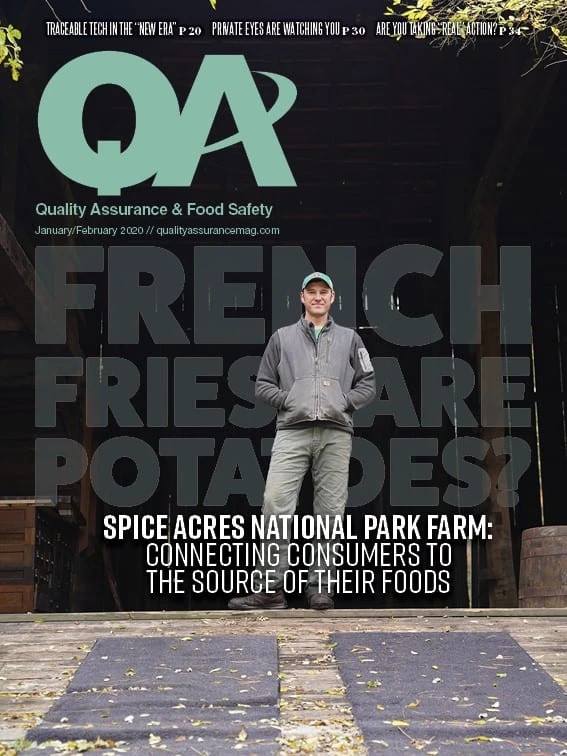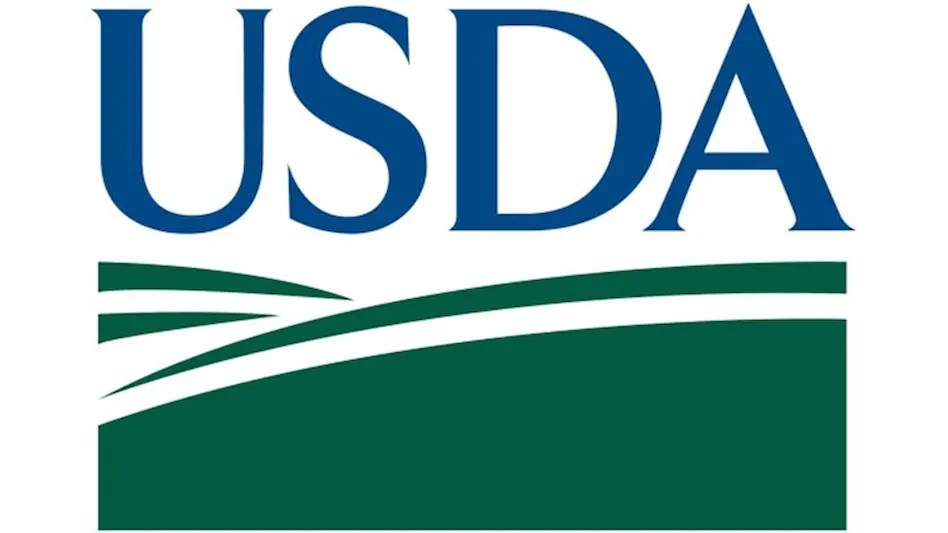
The man is slouched low in his well-lived-in car, his hat is pulled down over eyes hidden behind dark sunglasses. Every so often, he takes a long chug of now-lukewarm coffee in a weak attempt to stay alert.
It’s a classic TV/movie/book depiction of a private detective on the job. From those, we all know that private “eyes” spend their time watching for the movement of a crime-lord’s car, awaiting the appearance of an unfaithful spouse (camera at the ready), or trying to catch a serial-criminal in the act. So that doesn’t account for much call for them in the food industry. … Or does it?

Did you know … the food industry has a professional, highly sought-after “food spy” in its midst with a “global network of trusted and specially trained intelligence-gathering operatives” who uncover and expose the criminals and crimes of food fraud.
“Food fraud is a crime,” said Mitchell Weinberg, founder and CEO of Inscatech. “It is the intentional adulteration of food for economic gain. While its intended impact is economic, food fraud can cause both economic and physical harm, and has often been linked to illness and death.” It is for just that reason that he founded “the world’s only company specializing in food fraud detection and prevention investigations” and has been internationaly featured on The Dr. Oz Show, Bloomberg News, Inside Edition, Weekend Sunrise (Australia), Reuters, Radio New Zealand, The New York Times, and Wired Magazine, to name a few.
Prior to starting Inscatech, Weinberg was a practicing lawyer and vice president and general counsel of a multinational electronics company where he defended his client in an investigation of alleged criminal activity, and investigated employment-related allegations of sexual harassment and discrimination. After leaving corporate legal practice, Weinberg started an international trade-compliance consulting firm. Working in China in 2009, unaware of the ongoing melamine scandal, Weinberg became seriously ill after eating ice cream. “It was a food poisoning unprecedented in terms of severity,” he said, adding, “That was the moment that would define the rest of my professional life.”
It was a moment which has since reverberated through the food supply chain. Wanting to fight back against such destructive fraud, Weinberg’s first action was to approach the Agri-Food and Veterinary Authority of Singapore. As a transshipment hub for food coming out of China, Singapore has a vigilant food safety focus. His initial idea was to set up a screening facility at the Port of Singapore for food fraud. The government was initially interested, but when they all realized they would be setting themselves up as a watchdog, they determined they might be overstepping their bounds, and backed away from the idea. So, going back to his legal and investigatory experience, Weinberg decided to bring together his connections in the intelligence world under one umbrella to combat food fraud. It is this group — which includes those who had previously worked in law enforcement and government intelligence agencies around the world that has since become his “network of operatives.”
It was important to work with those with such experience because conducting undercover investigations and surveillance to expose potential criminal activity is inherently dangerous. The investigators and their families can be threatened, harassed, or even murdered to keep a crime from being uncovered. “It is very, very high risk,” Weinberg said. And it requires strong, ethical individuals who won’t be intimidated or compromised. “They are really uncorruptible,” he said. “That’s really important, because if I can’t trust them, the credibility of my work is at stake.”
THE INVESTIGATION. So how do Weinberg and his network of operatives investigate food fraud? Where do they start?
When he began the company, food businesses came to him with a knowledge or suspicion that something was wrong with an ingredient, so they would ask him to investigate the supplier or those in that geographic area. While he still works with companies who approach him, Weinberg has changed his focus to proving that food is authentic, as opposed to proving it is fraudulent, with a current focus on honey.
Just as he would with any criminal investigation, Weinberg’s first step is to gather background information to get “a lay of the land.” He conducts a preliminary investigative assessment through calls, reviews publicly available information, etc., then moves onto more covert information sources. The initial goal is to build the case remotely. The next step: to monitor the target. What is the business’ usual activity? Who are its employees and officers? Is the food produced at a single or multiple locations? What is being brought into and taken out of the production facility?
Some information may be attained by observation; some by casually approaching current and former employees. Although they are often hushed up by the producer, they are the ones who are doing the adulteration and are aware of it, so someone can often be found who is willing to talk.
Then, Weinberg said, “We look to get confirmation.” This may be through an operative getting hired as an employee, approaching management posing as a buyer, or otherwise gaining access to a production facility. Once “inside,” the operative conducts on-the-ground surveillance, using hidden cameras to take photos or videos, continuing employee discussions, or otherwise gathering whatever evidence can be had.
“Fraud is most prevalent at the first site of production or where the food is collected,” Weinberg said. For example, there are hundreds of thousands of cocoa farmers on the Ivory Coast, but it is at the point of converting the beans to powder or other derivatives where the adulteration usually takes place. “Adulteration usually occurs in the country where the ingredient was harvested and put into another form, but it can take place in another country that is complicit in the fraud to avoid detection,” he said.
Once fraud is detected, it’s up to the client who initiated the investigation to decide what is done. If they want to involve law enforcement, Weinberg or his operatives will work with the applicable agency, perhaps conducting a surprise raid. But, just as often, he said, the company simply “slaps the supplier on the wrist to let them know they know what’s going on.” While this may stop some fraud, it often just causes the criminals to change their methods of doing so.

TAKING ACTION. While fraud does occur in the U.S., it tends to be more in the form of cover-ups than of adulteration. “Food fraud is economically driven,” he said. “It’s all about profit.” As an intentional act, food fraud is more like food defense than food safety, but, too often, it is included in food safety plans instead of food defense. And that is one of the key problems with any industry attempts to detect and prevent fraud, Weinberg said. It is either being addressed as a food safety issue or is being covered up by businesses “turning a blind eye or failing to look more closely at it,” he said.
When action is taken, it often is in the form of a risk/vulnerability assessment. But, Weinberg said, “We know there’s risk for this. It’s a given, so you don’t need to do a vulnerability assessment.” So, while there is some potential overlap with food safety and food defense, the food fraud fight has to be approached differently. “Food safety has hit a wall in terms of making progress in this area,” Weinberg said, “There is a fundamental disconnect.”
“It’s not that companies aren’t aware of it, they don’t know how to deal with it,” he said. Any action they take could upset their entire business and commodity import operations. Because of this, even businesses that hire Weinberg to investigate a suspected issue are often not happy when he comes back with evidence of fraud. “They question me and challenge me, so it’s a matter of proving it.” Because of that, he now includes sample testing, but he also has found that major labs are often reluctant to get involved, so as to not risk the ire of the food industry that employs them.
Weinberg does not see increased regulation as helping, he said. “Fraud is already a crime. We don’t need more laws to address or define fraud, it should just be treated like any other crime.”
What will help? He believes it needs to be driven by consumers and retailers. Retailers need to hold producers accountable, who then, in turn, need to hold their suppliers accountable — all the way back to the source, no matter the continent or country that may be. “We’re 10 years beyond the melamine scandal,” Weinberg said. “But we’re no further ahead because we’re not changing sourcing practices.”

Explore the January February 2020 Issue
Check out more from this issue and find your next story to read.
Latest from Quality Assurance & Food Safety
- Bird Flu: What FSQA Professionals Need to Know
- Registration Open for 129th AFDO Annual Educational Conference
- Frank Yiannas, Aquatiq Partner to Expand Global Reach of Food Safety Culture
- World Food Safety Day 2025 Theme: Science in Action
- Ancera Launches Poultry Analytics System
- USDA Terminates Two Longstanding Food Safety Advisory Committees
- Catalyst Food Leaders Announces Virtual Leadership Summit for People in Food
- Food Safety Latam Summit 2025 Set for Mexico City





